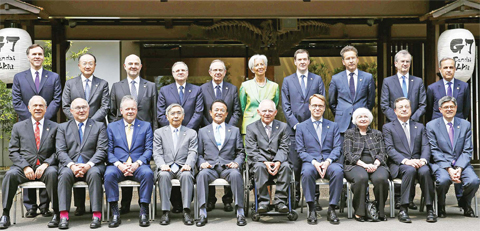 AKIU, Japan: Japanese Finance Minister Taro Aso (fifth from left in front row) poses with other finance ministers and heads of central banks of the Group of Seven for a group photo in Akiu, northern Japan, yesterday. — AP
AKIU, Japan: Japanese Finance Minister Taro Aso (fifth from left in front row) poses with other finance ministers and heads of central banks of the Group of Seven for a group photo in Akiu, northern Japan, yesterday. — APSENDAI, Japan: A British vote to quit the European Union would inflict a "shock" on the global economy, G7 ministers said yesterday, presenting a united front against the prospect of a "Brexit".
Among the most vocal was German Finance Minister Wolfgang Schaeuble, who strongly cautioned against opting to leave the 28-member EU in next month's referendum.
"We were all of the opinion that it would be the wrong decision for the UK," Schaeuble said at the conclusion of two days of talks in northern Japan among Group of Seven finance ministers and central bank chiefs. "But it's a decision to be taken by the British voters. We're concerned that it could have negative consequences for the European and the world economy."
The club of rich nations also issued a statement that warned a Brexit would only worsen the outlook for an unstable world. "Uncertainties to the global outlook have increased, while geopolitical conflicts, terrorism, refugee flows, and the shock of a potential UK exit from the European Union also complicate the global economic environment," they said.
As the June 23 referendum on Britain's future draws closer, finance minister George Osborne said his meetings with G7 counterparts underscored the gravity of the in-out decision. If voters opt to leave, Britain would find it "extremely difficult" to conclude trade deals with European Union countries, he told the BBC.
"If Britain left the EU, and wanted access to the single market... then we would need to pay into the EU budget and we'd have to accept free movement of people but we'd have no say over those policies at all," he said.
"We would have a two-year period to negotiate our exit with 27 other countries, we'd then have to negotiate new arrangements...and at the same time conclude over 50 trade deals with countries that aren't even in Europe."
On a visit to London last month, US President Barack Obama said Britain being in the EU magnified its global influence, and outside the bloc it would go to the "back of the queue" when it came to signing trade deals. International Monetary Fund Managing Director Christine Lagarde has also lent her voice to the "Remain" campaign, warning that quitting the EU would be "pretty bad to very, very bad" for the British economy.
Sputtering economy
The finance ministers yesterday voiced concern about the sputtering global economy as they looked for a plan to stoke growth, while a currency policy clash overshadowed their meetings.
The club of rich nations also pledged to tackle tax avoidance in the wake of the Panama Papers investigation and beef up efforts to disrupt the murky world of terrorism financing.
Two days of talks at a hot spring resort in northern Japan focused on how to stoke global growth which they said was under threat from myriad challenges, including terrorism, refugee flows and the threat of Britain's exit from the European Union. The ministers were unanimous in opposing the prospect of a "Brexit", saying it would inflict a "shock" on the global economy that would only worsen the outlook at a time of geopolitical instability. Host Japan was keen to get its G7 counterparts on board with the view that fiscal stimulus is the best way to kickstart global growth, but Germany and Britain were cool on the idea.
Yesterday, the group suggested a go-your-own-way approach. "(We) discussed how to employ a balanced policy mix-monetary, fiscal, and structural-taking into account country-specific circumstances," they said in concluding remarks.
Japan's determination to tame the resurgent yen was another sensitive topic, after its repeated threats to intervene in forex markets put it on a collision course with its G7 counterparts.
The yen has seen several steep jumps since the start of the year, soaring more than 10 percent against the greenback at one stage, in a blow to Japan's exporters just as the economy slowed. US Treasury Secretary Jacob Lew kept up the pressure Saturday with a fresh warning, reminding Japan that previous commitments to "refrain from competitive devaluation and communicate closely have helped to contribute to confidence in the global economy".
Yen clash
In a statement which presented a clear rebuff to Japan, the group "underscored the importance of all countries refraining from competitive devaluation". In response, Japanese finance minister Taro Aso said yesterday that he told his US counterpart Tokyo was merely reacting to "one-sided, abrupt, and speculative moves" in forex trading.
A softer currency has been one of the pillars of Japanese Prime Minister Shinzo Abe's bid to revitalise the world's number-three economy since he swept to power in late 2012. Japan last intervened in currency markets around November 2011, when it tried to stem the yen's rise to keep an economic recovery on track after the quake-tsunami disaster earlier that year. The G7 finance chiefs also vowed to escalate efforts to disrupt the financing of global terrorist networks. An action plan that their leaders are to sign at a summit in Japan next week set out measures to step up intelligence-sharing, freeze assets and tighten reporting rules on international transfers.
"Countering violent extremism and bringing perpetrators to justice remain top priorities for the whole international community," said the group which takes in the US, Japan, Germany, France, Italy, Canada and Britain. "The G7 commits to working together to strengthen the global fight against terrorist financing," they added.-AFP









